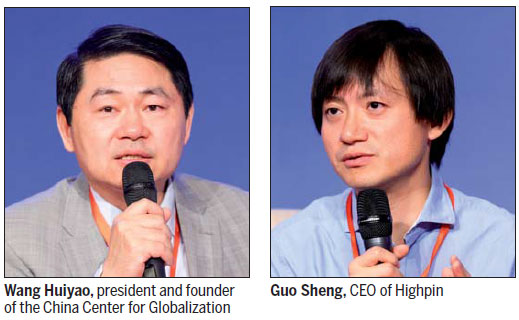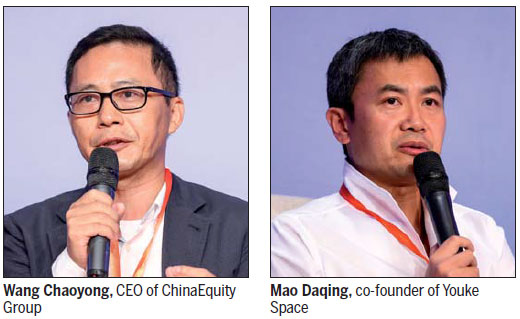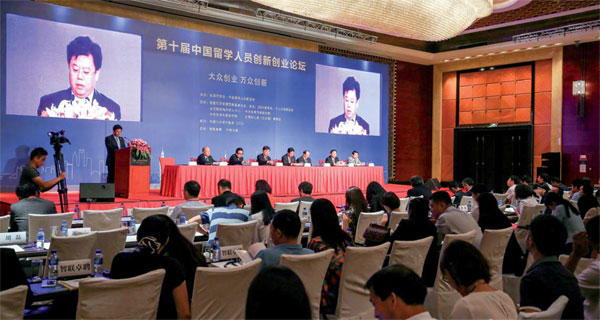Returnees more willing to go it alone
Updated: 2015-08-21 08:18
By Chen Yingqun(China Daily Europe)
|
|||||||||||
Setting up a business is becoming a popular choice among Chinese coming back from overseas
Setting up a business is becoming much more common among China's overseas returnees, and the government should make a greater effort to cater to their needs, industry experts say.
"The desire among these people to start a business has become noticeable," said Liu Limin, the vice-minister of education, at a forum on returnees' entrepreneurship and innovation in Beijing on Aug 16.
|
Speakers address the audience at a forum on returnees' entrepreneurship and innovation in Beijing on Aug 16. Photos provided to China Daily |


The forum, hosted by the China Center for Globalization, attracted thousands of overseas returnees. Liu said that in technology innovation and entrepreneurship, oversees returnees can deliver advanced technology and management skills and legal knowledge to China, and this could be a new driving force for economic growth.
That is particularly so in setting up high-tech ventures, "which helps narrow the gap between China and developed countries in many sectors", he said.
According to the ministry, last year there were 364,800 Chinese returned from overseas, 3.2 percent more than in 2013. By the end of last year about 1.8 million overseas students had returned to China, a little more than half the number of students studying overseas.
"More people are returning because of China's emerging power and government efforts to attract more talent," says Wang Huiyao, president and founder of the China Center for Globalization.
Guo Sheng, CEO of Highpin, one of the biggest recruitment websites for mid- and high-level talent in China, says that once overseas returnees are in China most opt to live in big cities, with 30 percent choosing Beijing, for example. However, in the past few years, fewer are opting for first-tier cities, with many going to smaller cities in central and western China.
When they set up a business or make career plans, many focus on industries such as the Internet, biological medicine and IT, Guo says.
Many returnees who have spent several years abroad also face the problem of having lost social contacts, so they opt to work with fellow returnees.
"Being piled into big cities, connected closely by social networks and focused on similar industries are three common features," Guo says.
The China Center for Globalization and Highpin recently published the Investigative Report on Chinese Returnees Employment & Entrepreneurship, looking at the careers of overseas returnees born in the 1980s and 1990s.
The report says when returnees choose cities, they no longer focus so much on first-tier cities, and most of the businesses they set up are in high-tech and other modern service sectors.
When they choose where to live, they consider social networks, industry base, the strength of the market and the environment, the report says.
Among the overseas returnees surveyed, more than half said they recognize the value of studying overseas, including building their international perspective (78.7 percent), language skills (78.3 percent), independent thinking (71.3 percent), and adaptive capacity (68.9 percent). Professional skills and communication skills are also widely recognized.
More than 65 percent of the overseas returnees surveyed said they could recoup the money that had been spent on their education and living expenses in five years. More than 80 percent said they could successfully integrate into communities.
Though many are being attracted to cities in Central China and in the west, most still said they would work in first-tier cities.
Wang Chaoyong, chairman and chief executive officer of ChinaEquity Group, one of China's earliest independent institutions devoted to venture capital investment and private equity investment, says the decision of overseas returnees to set up businesses differs to what prevailed 16 or 17 years ago.
"At that time many Chinese returnees would copy the styles of Western Internet companies, for example, bring over Yahoo's model and build up Sohu, bring over Goggle's model and create Baidu. They brought many modes of the Internet to China, which was the first wave of Internet startup companies."
Now the returnees bring a lot more varied resources, teams and business models to China, Wang says. In the past, many of those who started companies were returning from Silicon Valley in California, whereas now they can come from many different places such as Europe and Australia.
Wang says ChinaEquity Group has invested in more than 10 entrepreneurial teams that have returned from Europe in the past year, bringing with them various technology and concepts, especially in areas such as environmental protection, medical equipment, life sciences, fashion design and industrial design.
He says that as China is working on many big projects, such as the Belt and Road Initiative, it will need a lot of talent, so China should make it easier for returnees to work in government departments.
"We still have many barriers on the use of talent, and we should work out policies to let more returnees work in the public sector, which would also help improve systems to encourage innovation and entrepreneurship."
Wang Huiyao of the China Center for Globalization says that what China advocates now is innovation and entrepreneurship in spirit, not asking everyone to start a business, but everyone having a spirit of innovation and entrepreneurship.
At present there are certain things you have to do to set up a business, and you cannot do so blindly or by copying others, he says. You need experience, good service, and a good team, and it is not enough to rely on technology.
Wang Huiyao, who has done research on think tanks, says that think tanks, foundations and NGOs are also promising sectors in which returnees could start a business.
Mao Daqing, one of the founders of Youke Space, a venture project, says that in the US some graduates set up education and training programs for innovation and entrepreneurship. So in an innovative society, training and education related to new business models and startups should also be very active.
"People who start training and education schools are also entrepreneurs who understand industries and could tell people how to do that. This phenomenon has had a big impact on me."
Mao says the founders of Youke Space are working on a business school that will target overseas returnees, to help them learn how to localize their services and better understand local conditions and industries so as to make startups work better.
chenyingqun@mail.chinadaily.com
( China Daily European Weekly 08/21/2015 page20)
Today's Top News
No cyanide detected from Tianjin river section with fish deaths
Greek PM to resign, seek snap election in September
Britain to reopen embassy in Tehran this weekend
Chemical plants to be relocated in blast zone
IMF to extend current SDR basket until September 2016
China-Russia joint military drill no reason for concern
Rebels in Ukraine's Donetsk plan referendum on joining Russia: media
Man in yellow shirt is Bangkok bomber: Police
Hot Topics
Lunar probe , China growth forecasts, Emission rules get tougher, China seen through 'colored lens', International board,
Editor's Picks

|

|

|

|

|

|







